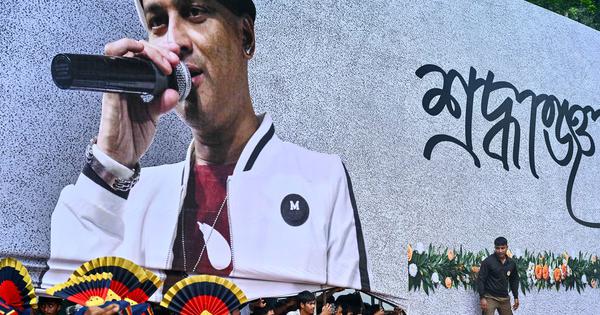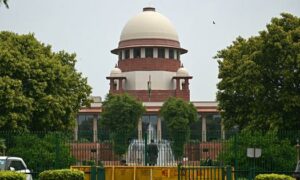
On Wednesday morning, Pijush Hazarika, a senior cabinet minister of Assam’s state government, and a government spokesperson, uploaded dramatic photos on X of two individuals behind bars.
The two, who had been arrested earlier that morning, were linked to the singer Zubeen Garg, who had died on September 19.
One was his manager, Siddharth Sharma. The other, Shyamkanu Mahanta, was the organiser of the North East India Festival in Singapore, for which the singer had travelled to perform. But Garg died of drowning the day before the scheduled performance, after going out to sea on a yacht and entering the water for a swim.
Since the singer’s death, a flurry of FIRs had been filed against the duo – more than 60 in all, according to the Press Trust of India. These accused them of murder, among other crimes.
In his post on X, Hazarika credited Chief Minister Himanta Biswa Sarma for “delivering justice” for Garg.
It was an unusual step for such a senior public official – not just to display such a personal interest in one particular case, but also essentially declare that those who had been arrested were guilty.
Some argued that the minister’s comments violated the rights of the two men. “No conviction yet. But pictures already shared, which is a violation of rights of those accused,” Manoranjan Pegu, a scholar from the state, wrote on X.
He added that while Garg “deserves justice”, the minister’s approach was creating “a public spectacle” and that he was uncertain “if this is the right way to go about it”.
A criminal lawyer from Delhi who requested anonymity concurred with this view. Hazarika had “gone ahead and declared them as people that are behind Zubin Garg’s death”, he said. “He has basically violated principles of natural justice and the rule of law.”
But the minister’s move came after many days of simmering discontent in the state. For four days after Garg’s death, the capital Guwahati was brought to a standstill as lakhs of people gathered to pay their respects.
Over those days, the state government appeared to have been taken aback by the extent of public anger about Garg’s untimely death, some of it even directed towards figures in or close to the government.
On social media, for instance, many pointed out that Mahanta had close links to powerful individuals: for instance, his eldest brother Bhaskar Jyoti Mahanta is a former director general of police, and now the state’s chief information commissioner.
Shyamkanu Mahanta has also been photographed on several occasions with the chief minister and his wife. Another brother Nani Gopal Mahanta is the vice-chancellor of Gauhati University – in July, 2021 the Rashtriya Swayamsevak Sangh chief Mohan Bhagwat released a book that Nani Gopal Mahanta authored.
As public anger intensified it spilled out through protests in Guwahati and elsewhere. On September 25, fans of Garg tried to storm Siddharth Sharma’s apartment in Guwahati. The mob also allegedly pelted stones at police personnel at the scene, leading them to resort to a lathi charge.
In response to the unrest, the chief minister urged residents of the state not to incite violence and turn the state “into Nepal”.
As the government struggled to keep up with the massive outpouring of public emotion, Hazarika’s post on X appeared like a belated overcorrection, an effort to keep up with the rising tide of public sorrow at the loss of cultural colossus.
Garg’s “death triggered an unprecedented avalanche of rage that was suppressed for a long period of time”, sociologist Uddipan Dutta, who teaches at Gauhati University, told Scroll. “This fury of the people is now directed against a group of people who reaped the benefits of the commodification of the culture in the post-globalisation era.”
“Curiously, they were not the artists,” he added, “but a group of businessmen and politicians who organised various festivals, award ceremonies and myriad other events.”
Media and commentators
Public anger after Garg’s death was stoked by statements by prominent individuals and organisations.
Immediately after the incident, senior editors and television journalists began to blame Mahanta and Sharma and demand that they be brought back to the state soon.
On the same evening that Garg was declared dead, a lawyer in Morigaon filed an FIR against the two, accusing them of murder.
In the days that followed, others filed more FIRs across the state, in places like Guwahati, Jorhat and Bongaigon, till the tally crossed 60. The charges against the duo and others who knew Garg and had travelled to Singapore for the festival included criminal conspiracy, culpable homicide not amounting to murder and causing death by negligence.
On September 20, the Assam government transferred all the cases to the Criminal Investigation Department. Four days later, the government constituted a nine-member Special Investigation Team of the department to investigate the case, led by special director general of police Munna Prasad Gupta.
Civil society organisations also contributed to the ferment. “Zubeen was our national treasure, he was our diamond,” Samujjal Kumar Bhattacharya, chief advisor of the All Assam Students’ Union, the state’s most influential civil society organisation, said on September 25 at a press meet in Guwahati.
Bhattacharya claimed that doctors had “repeatedly told Zubeen to avoid fire and water” – Garg was known to experience epileptic seizures, and doctors typically consider situations involving fire, water and heights as potential risks. In 2022, Garg had suffered a head injury in Dibrugarh, and in July 2024, he was hospitalised in Guwahati following a seizure.
Therefore, Bhattacharya said, Garg should “not have been allowed to enter the sea”.
He added, “For this Shyamkanu Mahanta is responsible” – although Mahanta was not on the yacht with Garg.
In a post on Facebook on September 25, Mahanta argued that he was being framed for “TRP purposes”.
Bhattacharya also pointed a finger at Sharma. “What is the responsibility of the manager Siddharth?” he said. “It was their responsibility to care for him. They have not done it. This is extreme negligence and inexcusable crime.”
Though Garg’s wife Garima Saikia Garg had initially asked for the case against his manager Sharma to be dropped, on September 29, in a video posted to Facebook, she suggested that he and Mahanta had been negligent.
“Siddarth knew that Zubeen was not supposed to swim because of his health issues,” she said.
The same day, in comments to reporters, she said, “Why did they not lift him from the water when they knew he was not in a condition to swim?”
Garg’s cousin Sandipan Garg, who is a deputy superintendent in the state police was also present on the yacht – while he has not been blamed in public conversation for the incident, he has also been questioned by the Special Investigation Team handling the case.
‘A commodity’
Anger was also fueled by longstanding allegations that Mahanta and Sharma were exploiting Garg`
Observers noted that Sharma, who had been Garg’s manager since 2014, was a partner with Garg in a company called Zubeen Garg Music, registered in 2021.
Some claimed that he held “exclusive control” over the rights to Garg’s work following his death.
Sharma sought to refute these claims in a Facebook post before his arrest. He stated that “most of the 38,000 songs” that Garg had recorded “are owned entirely by other music labels and production houses. He himself never received money from them, apart from a few thousand rupees as one-time singing fees.”
As for the income from the songs owned by the company he co-founded with Garg, he said, “the revenue of these songs is only a few thousand every month. Every rupee goes into the company account, and no one has ever withdrawn a single penny.”
He added, “Zubeen da owned 60% of the LLP, and it will be my privilege to ensure that the remaining balance is also transferred to his family.”
Mahanta, too, faced accusations of exploiting Garg. In fact, his own niece, Srijani Bhaswa Mahanta, who is the daughter of the state’s chief information commissioner Bhaskar Jyoti, accused him of treating Zubeen as a “commodity”.
In response to growing public opinion against Mahanta, the government moved swiftly to distance itself from him. A day after Garg’s cremation on September 24, the Assam government blacklisted Mahanta, declaring that programmes or events run by him would not receive any financial grants, advertisements or sponsorships from the government. On September 28, the Criminal Investigation Department also launched a separate probe against Mahanta for alleged misappropriation of government funds, money laundering, cheating and forgery.
In his post on X, the cabinet minister Hazarika argued that the government’s response to the tragedy had been exemplary.
“From bringing his mortal remains home to Assam, ensuring a dignified and peaceful farewell, taking swift action with arrests, to firmly standing up against fringe elements who tried to misuse Zubeen Da’s name for their agenda – every step was decisive,” Hazarika said.
Chief Minister Sarma even declared that people should not vote for the BJP in the 2026 state election if they don’t “deliver justice to Zubeen”.
Accountability or public trial?
Amidst this storm of events, voices like that of Manoranjan Pegu, who caution against a public trial, are largely going unheard.
“No clear evidence that Mahanta and Sharma had knowledge that allowing Garg to swim would ‘likely’ cause death,” one Delhi-based lawyer said. “At most, negligence is established, not culpable homicide.”
Another Guwahati-based lawyer said that the actions against Mahanta and Sharma would seem to “stem from majority appeasement, as everyone is asking for their blood”.
Indeed, many fear that public opinion against the accused is so intense that there is a risk they may not receive a fair trial.
This was strikingly apparent in a Facebook note by Angshuman Bora, a senior lawyer who specialises in bail matters. Bora, on September 24, wrote that “as a defence counsel, I have already declined to represent two of the individuals owing to my personal reasons”.
He added, “Nonetheless, the people of Assam have already rendered a moral verdict, which can be a more severe penalty in near future.”
On October 1, Singapore police provided the Indian high commission in the country with a copy of Garg’s autopsy report. The report confirmed that Garg had died of drowning, and ruled out the possibility of foul play.
But violent rhetoric against Mahanta and Sharma continued to circulate. In a video posted to Facebook on October 1, Shrinkhal Chaliha, leader of the ultra-nationalist organisation Veer Lachit Sena leader is seen telling reporters that the two “have been given death penalty in the people’s verdict”.
He added, “If they come out securing bail, the people will beat them to death. There are only two options – police will shoot them or the public will beat them to death.”
📰 Crime Today News is proudly sponsored by DRYFRUIT & CO – A Brand by eFabby Global LLC
Design & Developed by Yes Mom Hosting






